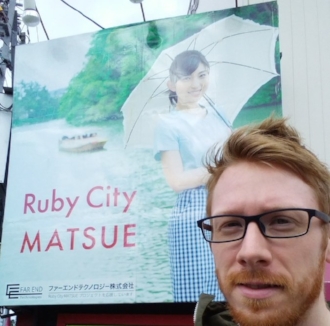How is Ruby Different in Japan?
/I've had a few conversations recently where I say things like, "the Japanese Ruby community uses Ruby for different things than in America"... and I get blank stares. Specifically, I mention that America is very centered on Rails and web apps with Ruby. No surprise, right?
"But then," people ask, "if they're not using Ruby for Rails, what do they do with it?"
And why does anybody care? For the same reason I have these conversations. Because the American style of Rails usage lends itself to throwing huge amounts of memory and concurrency at your problems, and the Japanese style of Ruby usage does not. This normally comes up when they ask, "but why can't Ruby just use JIT?" JIT is complex and memory-intensive. It's great for running a web server. It sucks for... Well, let's look at what the Japanese folks do, shall we?
(The wonderful Twitter exchange in response to this post also examines what's up with MRI and JIT. If you're here for the JIT, it's worth a read.)
The Photogenic Zachary Scott and a billboard for "Ruby City Matsue" in Shimane Prefecture, Japan
A Difference in Community
The American Ruby community mostly happened because of Rails. Yes, yes, Ruby had a long and storied history before Rails happened (and yes, it did.) But America finally noticed Ruby because of Rails.
As a result, Ruby's fortunes in America have looked a lot like how Rails is currently doing. Rails rose and Ruby rose. Rails has mostly peaked and is decreasing, and so is Ruby. It's not that Ruby is only used for Rails -- it isn't. But the two have risen and fallen together in the United States, and in most of the English-speaking world.
Japan has looked a little different. Not only was Ruby popular long before Rails came along, Rails wasn't the sort of wildfire in Japan that it had been in America. And now that the tides of Rails are receding and you're seeing fewer American regional Ruby conferences...
Japan has them all over the place, and only increasing in number. Ruby-no-Kai is Japan's version of Ruby Central, and is hosting six or more regional RubyKaigi (Ruby conferences) this year -- just in Japan! Some of the conferences are new, some have met for the last few years, up to 11 years (!) for the older ones. And of course, there's the worldwide RubyKaigi. There is also an enterprise conference, Ruby World. And multiple award conferences: RubyBiz and the Fukuoka Ruby Awards, plus a Ruby Prize at Ruby World. Ruby is still very much growing in Japan. As a fun little aside: Ruby-no-Kai tracks their conferences with a bug tracker. So you can see them there.
Another difference: government sponsorship. Japan is very proud that Ruby was invented in Japan and is still based there. FCOCA, part of Fukuoka Prefecture, sponsored multiple American Ruby tours and a bunch of embedded Ruby work, and a variety of Ruby-based contests and awards. Shimane sponsors Ruby work as well, and has Matsue ("The Ruby City".) There are areas that used to be miniature Silicon Valleys of their own, and their local government is trying to get over that hump with... Ruby. Often, but not always, embedded Ruby and Ruby IoT devices.
That's one reason you see a lot of Japanese government sponsorship for mruby. American audiences often ask, "why would you want an embedded Ruby?" But for the Japanese, it's a lot of how they were already using Ruby. Ruby has great memory usage and embeds pretty well. mruby embeds really well. But embedded Ruby and mruby aren't a big part of the English-speaking Ruby world.
One other major difference in the Japanese Ruby community is how centralized it is. Many of the core contributors like Koichi Sasada, Shyouhei Urabe, Yui Naruse, Zachary Scott and Akira Matsuda live within 10-15 minutes of each other and talk often. Matz, of course, talks to them all regularly, including at regular committer meetings. Their regional conferences are run primarily by one organization, and their sponsorship comes primarily from a few specific sources.
One more point that affects how the core Ruby committers view Ruby technically: Matz is employed full-time by Heroku, and Koichi (author of the current Ruby VM, Director of the Ruby Association) was until recently. Heroku is an American company, owned by SalesForce. But it's also a hosting company, and so its views on memory usage (its biggest expense) versus CPU (often idle, easy to 'move' between VMs) is rather different than an American company hosting Rails on raw EC2 instances. They also really want Ruby to behave well on the smallest Heroku instances, for all sorts of good reasons.
A Japanese Enterprise Ruby Conference
For some other differences, let's look at the program for Ruby World 2016, which happened in Matsue, Shimane, Japan.
The first Ruby World talk was about using Ruby for an in-car electrical control unit testing machine. The second talk was about using embedded mruby to develop applications for embedded hardware. So yes, there's that embedded thing...
The third talk is about Enechange, an electricity price comparison service. That one would have a web site, but it's still not what you'd think of as a typical U.S. Ruby-based startup.
Next is sponsor talks from Hitachi, and from Eiwa System Management. Based on their company page, which mentions "in-vehicle system development of automobiles," I'd guess there is some embedded Ruby-in-cars going on there too.
The following two talks are about Scientific Computing, followed by machine learning infrastructures. Both are useful, and both happen in the English-speaking Ruby world as well, but I see them more from the Japanese Ruby community. On the "Japanese data management" front, Treasure Data is also worth a mention. They're also a significant force in the Japanese Ruby community, and they also employ prominent Ruby folks.
The next Ruby World talk, on learning mruby with Lego MindStorms does sound like something you'd see at an English-language Ruby convention, but it's also embedded. And after a "scaling the company with Ruby" talk from R-learning, an "IT services and support" company, is one called "Tried to start programming class for children in a small town," which again sounds like something you'd see at a Ruby convention in California or New York.
A lot of the other talks are also about the business or practice of development rather than applications of Ruby -- for instance about Agile, DevOps and how to get a job as a developer. And after a sponsor talk from an IoT sensor company focused on sake brewing, there's a sponsor talk from a Rails consultancy. So it's certainly not as if America and Japan use Ruby totally differently.
Same and Different, Different and Same
You'll see some Ruby on Rails in the Japanese community, it's true. But you'll also find that they often use it a bit differently -- like CookPad, which proudly runs the world's largest Rails monolith, basically by using Rails as a CMS. It's conceptually more like WordPress than it is like Twitter.
The Ruby Association, from Google's Street view
And of course, the English-speaking Ruby world isn't all Rails. You'll find some machine learning and IoT in American Ruby conferences. Presumably Ruby is even running in a car somewhere in America as well. There are definitely liaisons between the Ruby and Rails worlds, like Aaron Patterson, Akira Matsuda and Richard Schneeman. But the overall focus is different.
So: the next time you think, "why isn't Ruby perfectly optimized for Rails and Rails alone?" it's worth remembering the Japanese folks. That's where Ruby comes from. It's where most of the Ruby development happens. And it's a different world, doing different things. There's some Rails, yes. But Rails is a long way from being their whole world.
Many thanks to Zachary Scott, who knows far more about the Japanese Ruby community than I do. He read drafts of this article, suggested many new angles, and helped me see where I'd made some significant mistakes. A lot of the "Difference in Community" section is information he graciously pointed out and I hadn't known.
And many thanks to Matz for Ruby, for mruby, and for corrections to this article about mruby and Heroku!



